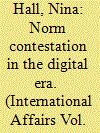|
|
|
Sort Order |
|
|
|
Items / Page
|
|
|
|
|
|
|
| Srl | Item |
| 1 |
ID:
184661


|
|
|
|
|
| Summary/Abstract |
Earmarked funding to international organizations (IO s) has increased significantly over the past two decades. International relations scholars have examined the causes of this trend, but know less about its effects on UN entities. This article identifies different types of earmarked funding, varying from low to high discretion delegated to IO s. Secondly, it examines trends in the UN Development Programme and UN Children’s Fund and finds that both have significant proportions of earmarked funding with low discretion. Drawing on thirty interviews, the article notes four implications of tightly earmarked financing: 1) higher transaction costs for IO s; 2) less predictable funding; 3) overhead costs that are rarely covered; and 4) increasing competition for financing. Overall, the article highlights that earmarked financing exists on a spectrum from tight to minimal control by donor states, and this has important implications for multilateralism.
|
|
|
|
|
|
|
|
|
|
|
|
|
|
|
|
| 2 |
ID:
167111


|
|
|
|
|
| Summary/Abstract |
Activists in the internet era are taking action through online petitions, twitter storms and by forming new digital advocacy organizations such as Campact, 38 Degrees and GetUp!. However, no International Relations (IR) scholarship has systematically examined the role of digital advocacy organizations in norm contestation. Digital advocacy organizations warrant study given their international reach, their large memberships, their longevity, their frequent campaigning activity and their claimed impact. This article focuses on the responses of three digital advocacy organizations in Australia, the UK and Ireland to the same external crisis: an increasing number of refugees worldwide. It asks: when and why did these organizations engage in behavioural norm contestation during the refugee crisis? Their use of behavioural contestation is a puzzle, given that digital advocacy organizations have low implementation power. The article draws on interviews with activists and experts, and finds that advocacy groups firstly use discursive contestation (debating the meaning and importance of norms), and then may engage in behavioural contestation (influencing the implementation of norms). Discursive contestation is less costly, and perceived to be less effective, than behavioural contestation. The article suggests that digital advocacy organizations can mobilize people online and offline, and IR scholars should examine this important source of power. This article forms part of the special section of the May 2019 issue of International Affairs on ‘The dynamics of dissent’, guest-edited by Anette Stimmer and Lea Wisken.
|
|
|
|
|
|
|
|
|
|
|
|
|
|
|
|
| 3 |
ID:
171844


|
|
|
|
|
| Summary/Abstract |
International relations (IR) scholars have recognized the importance of technology in enabling nongovernmental organizations (NGOs) to build transnational networks and enhance their influence. However, IR scholars have typically focused on elite networks across NGOs, states, and international organizations. This article considers how digital technologies generate new types of networked power between NGOs and their members. Digital tools allow for fast feedback from supporters, rapid surges in mobilization, and more decentralized campaigns. Importantly, in the digital era, NGOs must decide not only which digital platforms to use, but also whether to devolve decision-making to their supporters. Two questions arise: First, do NGO staff or supporters primarily define and produce advocacy content? Second, is the goal of digital activism to broaden or intensify participation? Answers to these questions generate four digital strategies: proselytizing, testing, conversing, and facilitating. These strategies change advocacy practices, but only facilitating strategies open up new forms of networked power based on supporter-to-supporter connections. Digital strategies have profound ramifications for individual organizations, the nature of the advocacy sector, and its power in relation to states, corporations, and other nonstate actors. Digital adoption patterns shape how NGOs choose campaigns, how they legitimate their claims, and what strategies they rely on.
|
|
|
|
|
|
|
|
|
|
|
|
|
|
|
|
|
|
|
|
|